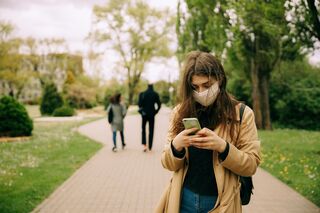Stress
3 Ways to Connect During COVID—and Why You Should
Staying connected promotes psychological and physical well-being.
Posted February 7, 2021
During my first semester of remote teaching last fall, I started every class meeting with a "high/low" activity: I'd start off by giving a high or low from my last week, and then every single student would share either a high or a low from their week.
In my more than 20 years of teaching, I'd never done this type of activity before (and in all honesty, would have not wanted to waste class time on it), but I tried it last fall in an attempt to build community in a remote class, with students participating from across the country and around the world. The students shared a range of things, from highs of learning how to grill chicken or getting an aquarium or going apple picking, to the lows of a mice infestation, getting stitches, or the Patriots losing. On my course evaluations, the students raved about that activity—that they loved it, that it built community, that they got to know their peers, and so on. It is exactly what I wanted to accomplish.
Why was helping students build connections so important to me? Because empirical research tells us that forming relationships—with friends and family members and neighbors—is a strong predictor of psychological and physical well-being. And that's why we all need to focus intently on making connections, especially since many of our natural connections—catching up with colleagues in the hall or with friends at a cocktail party or with family members around the Thanksgiving dinner party—just aren't available.
How can we connect—safely—during this time of COVID?

First, pick up the phone. We've all heard a lot about Zoom fatigue these days—yet often feel pressure to connect by seeing a friend or family member. But an intriguing study suggests that hearing someone may actually lead us to feel as connected as physically being with that person. Researchers in this study asked children to complete various stressful tasks—performing math and verbal tasks in front of strangers. The children then received one of three types of support from their mothers: by text, in a phone call, or in person. What type of contact felt worst—and best? Children who received the text had the same higher levels of cortisol—a hormone measuring stress—as those who received no support at all. But having a phone call was just as good as in-person visiting at reducing stress.

Second, write a gratitude letter. This strategy, which was developed by Dr. Martin Seligman at the University of Pennsylvania, involves writing a letter to someone who played an important role in changing or shaping your life for the better. It doesn't matter who the person is—a teacher, former boss, neighbor, or so on. All that matters is that you write a letter to this person, stating specifically what he or she did for you, and how it shaped your life. As you can probably imagine, the feeling of happiness—in both the person writing the letter and the person receiving the letter—can be truly profound.
Finally, build so-called "weak connections"; even small casual interactions, such as greeting a clerk at a store or exchanging pleasantries with a neighbor, can increase feelings of belonging and happiness. In one study, researchers bribed people on public transportation—with $5 gift cards to Starbucks—to initiate a conversation with a stranger. These bus and train riders were initially pretty hesitant to participate, in part because they assumed that strangers would not be very receptive to their approach. However, most people were pleased to have a casual conversation with a stranger. Moreover, people who had such conversations then reported higher levels of happiness than those who had simply sat alone.
It's easy—even natural—to focus on what's missing from our lives these days. I miss attending dinner parties with friends and celebrating holidays with my extended family and having lunch with my colleagues. But we can all find ways to connect, even during these unprecedented times. And making these connections can go a long way towards improving our physical and psychological health.


